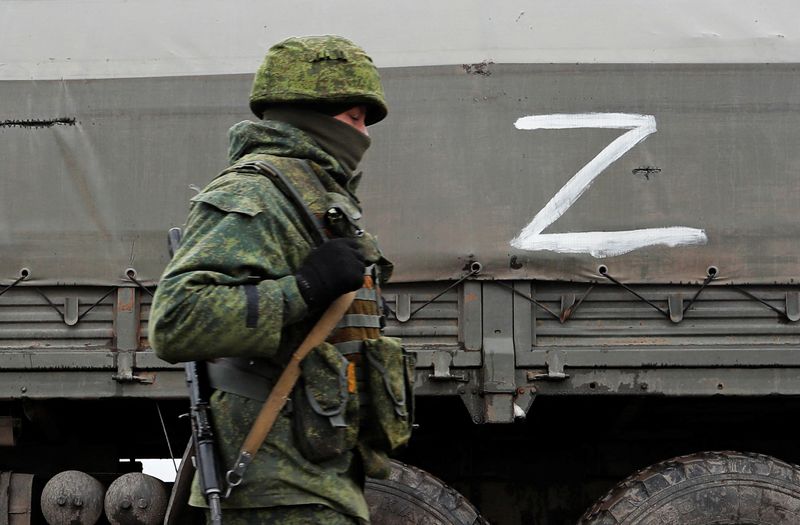 © Reuters
© Reuters
By Yasin Ebrahim
Investing.com -- The S&P 500 slipped Thursday, as investors piled into defensive sectors of the market amid ongoing concern Russia’s invasion of Ukraine will add to the red-hot pace of inflation that threatens to derail the economy.
The S&P 500 fell 0.5%, the Dow Jones Industrial Average fell 0.3%, or 96 points, the Nasdaq Composite fell 1.6%.
Utilities, a defensive corner of the market, was the biggest sector gainer as investors mulled the prospect of further inflation pressures following Russia’s invasion of Ukraine as prices for oil, wheat and precious metals trend higher.
The five-year breakeven rate on Treasury inflation protected securities – a closely watched gauge of inflation expectations -- jumped to 3.23%, a record high.
U.S. oil prices briefly rose to $116 a barrel intraday, pushing gas prices above $5 a gallon in some parts of the U.S. Oil prices ended the day in the red in a dramatic turnaround after the German Economy Minister Robert Habeck said he wouldn't support a ban on imports of Russian oil, gas and coal.
In testimony on Thursday, Federal Reserve Chairman Jerome Powell said the upward pressure on inflation was expected to continue for “at least awhile” and flagged the risk that the Ukraine crisis will prolong supply chain problems, which have been a key driver of inflation.
“It is not going to help at all with supply chains, because ships are not being offloaded,” Powell told members of the Senate on Thursday.
There was some progress on the Ukraine-Russia talks, meanwhile, as both sides agreed to reportedly agreed to organize safe corridors to evacuate civilians and to deliver humanitarian supplies.
French President Emmanuel Macron reportedly warned, however, that “the worst is still to come” in Ukraine as Putin is hellbent on taking “full control” through either diplomatic or military measures.
Tech stocks struggled to add to their gains from a day earlier, with big tech mostly lower, while semiconductor heavyweights like Nvidia (NASDAQ:NVDA), Advanced Micro Devices Inc (NASDAQ:AMD) and Intel also weighed on the sector.
Intel (NASDAQ:INTC) fell more than 1% after Morgan Stanley downgraded the stock to underweight from equal weight and cut the price target to $47 from $55, citing “more actionable opportunities elsewhere.”
While the longer term turnaround capability in Intel’s core business is a positive, the “next couple of years are likely to see the stock move sideways and we see more actionable opportunities elsewhere in our coverage," Morgan Stanley said.
Snowflake (NYSE:SNOW) slumped 15% after reporting fourth-quarter results that beat Wall Street estimates, but guidance fell short, stoking concerns of slowing growth ahead.
Best Buy (NYSE:BBY) jumped about 9% despite quarterly revenue and full-year guidance below analysts estimates.
Kroger (NYSE:KR) surged 11% after reporting earnings per share of $0.91 and revenue of $33.1 billion that beat estimates of $0.74 and $32.9 billion respectively, while guidance was also stronger than expected.
The weakness on Wall Street comes just a day ahead of the monthly jobs report expected to show the economy created about 600,000 jobs last month.
"The monthly jobs report is going to be huge for the market ahead of the inflation data expected next week, which I think will be elevated," John Luke Tyner, portfolio manager at Aptus Capital Advisors, said in an interview with Investing.com on Thursday. "Our estimates is around 500,000 jobs, but I wouldn't be too surprised by a stronger print."
"There are still a number of people on the sidelines, but the reduction in stimulus and government subsidies as well as the gap up in wages could entice people to work," Tyner added.

